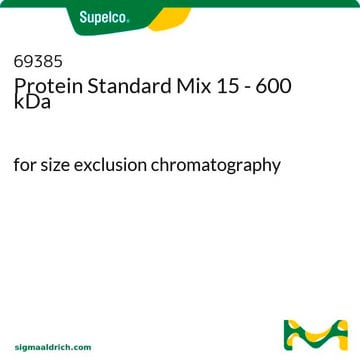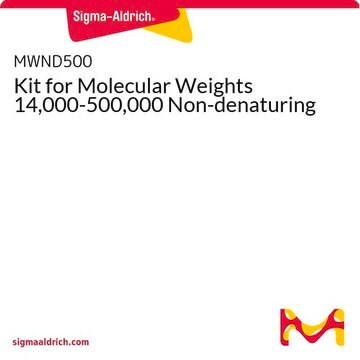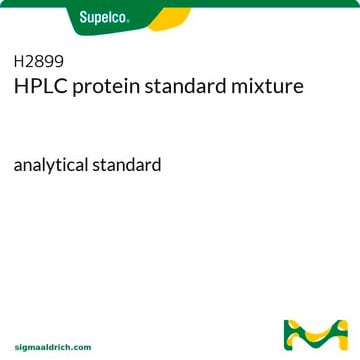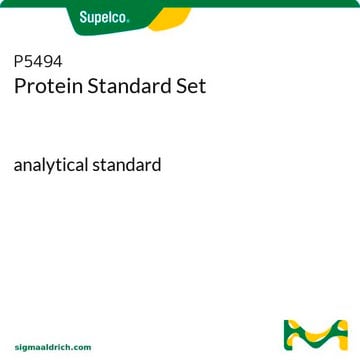160022K
MAPTrix™ Reagent
High Molecular Weight, aqueous solution
Anmeldenzur Ansicht organisationsspezifischer und vertraglich vereinbarter Preise
Alle Fotos(1)
About This Item
UNSPSC-Code:
12352202
NACRES:
NA.75
Empfohlene Produkte
Sterilität
Filtered sterilized solution
Form
aqueous solution
Mol-Gew.
~36.8 kDa
Verpackung
pkg of 2.5 mg
Konzentration
0.5 mg/mL protein
Methode(n)
cell culture | mammalian: suitable
Versandbedingung
ambient
Lagertemp.
2-8°C
Allgemeine Beschreibung
MAPTrix™ Reagent intended for use as cell culture coating.
Anwendung
MAPTrix™ Technology provides a true extracellular microenvironment (ECM) by presenting combinatorial peptide motifs. The ECM, defined by biochemical cues and physical cues, is a deciding factor in a wide range of cellular processes including cell adhesion, proliferation, differentiation, and expression of phenotype-specific functions.Currently existing technology offers simple and merely adequate environments that facilitate simple cell processes such as cellular adhesion. The simple presentation of cell adhesion motifs is not optimal for controlling more integrated processes. Crosstalk among signaling pathways act synergistically to enhance cellular responses such as cell adhesion or proliferation. A study showed that a combination of extracellular matrix derived peptides presented on a surface may enhance cell adhesion strength and focal adhesion assembly. The combinatorial presentation of ECM peptides on cell growth surfaces may also promote elevated proliferation rates of primary or stem cells.
Leistungsmerkmale und Vorteile
- Biochemically-defined, animal-free cell culture surfaces designed to enhance cell performance
- MAPTrix™ produces a uniform ECM surface that provides a highly controlled 2D extracellular microenvironment for cell cultures and related applications
- Adhesion properties of the mussel adhesive protein makes the coating reproducible & reliable
Rechtliche Hinweise
MAPTrix is a trademark of Kollodis Biosciences
Lagerklassenschlüssel
10 - Combustible liquids
Flammpunkt (°F)
Not applicable
Flammpunkt (°C)
Not applicable
Analysenzertifikate (COA)
Suchen Sie nach Analysenzertifikate (COA), indem Sie die Lot-/Chargennummer des Produkts eingeben. Lot- und Chargennummern sind auf dem Produktetikett hinter den Wörtern ‘Lot’ oder ‘Batch’ (Lot oder Charge) zu finden.
Besitzen Sie dieses Produkt bereits?
In der Dokumentenbibliothek finden Sie die Dokumentation zu den Produkten, die Sie kürzlich erworben haben.
S J Fashena et al.
Nature cell biology, 2(12), E225-E229 (2001-01-09)
Over the past twenty years, intensive research has enabled us to identify components of specific signalling pathways downstream of an array of adhesion and growth-factor receptors. The first Gordon Research Conference on 'Signalling by Adhesion Receptors', which took place in
Catherine D Reyes et al.
Journal of cellular physiology, 217(2), 450-458 (2008-07-10)
Cell adhesion to extracellular matrix (ECM) components through cell-surface integrin receptors is essential to the formation, maintenance and repair of numerous tissues, and therefore represents a central theme in the design of bioactive materials that successfully interface with the body.
Ying Meng et al.
FASEB journal : official publication of the Federation of American Societies for Experimental Biology, 24(4), 1056-1065 (2009-11-26)
Human embryonic stem (hES) cells are pluripotent, capable of differentiating into any cell type of the body, and therefore have the ability to provide insights into mechanisms of human development and disease, as well as to provide a potentially unlimited
Samuel Schmidt et al.
Cell and tissue research, 339(1), 83-92 (2009-11-19)
Adhesion and migration are integrated cell functions that build, maintain and remodel the multicellular organism. In migrating cells, integrins are the main transmembrane receptors that provide dynamic interactions between extracellular ligands and actin cytoskeleton and signalling machineries. In parallel to
Seung Tae Lee et al.
Biomaterials, 31(6), 1219-1226 (2009-11-21)
We present development and use of a 3D synthetic extracellular matrix (ECM) analog with integrin-specific adhesion ligands to characterize the microenvironmental influences in embryonic stem cell (ESC) self-renewal. Transcriptional analysis of 24 integrin subunits followed by confirmation at the translational
Unser Team von Wissenschaftlern verfügt über Erfahrung in allen Forschungsbereichen einschließlich Life Science, Materialwissenschaften, chemischer Synthese, Chromatographie, Analytik und vielen mehr..
Setzen Sie sich mit dem technischen Dienst in Verbindung.








